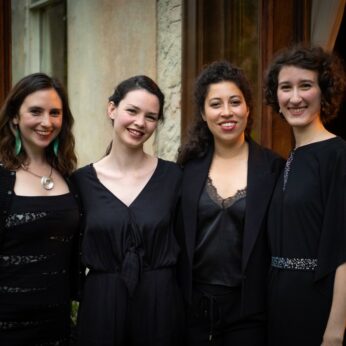Composer: Finola Merivale (b. 1987)
Performance date: 26/06/2022
Venue: Bantry House
Composition Year: 2020
Duration: 00:10:50
Recording Engineer: Eduardo Prado, Ergodos
Instrumentation: vn, vc
Instrumentation Category:Duo
Artists:
Mairead Hickey -
[violin]
Ella van Poucke -
[cello]

Finola Merivale [b.1987]
The silent sweep as you stand still [2020]
A typical Finola Merivale piece is pretty much on fire. Wielding chaos, the Manhattan-based Irish composer has made some of the most volatile stringworks you’ll ever hear, inviting audiences to join her in the throes of her own handcrafted turbulence. Writing her music on the periphery of what can be performed, her pieces demand the musicians who play them to live moment to moment, and sound improvised even at their most composed. They are built on unstable energies, contained in a refined space that can just barely hold firm.
Written in Paris on the cusp of the city’s second Covid-induced lockdown, The Silent Sweep as You Stand Still is an outlier in Finola Merivale’s discography. Where pieces have previously felt dense with interventions, both dynamically and structurally, The Silent Sweep is a quiet murmur, a single hum along a straight line. Looking out over a peopleless city, Merivale was inspired to write a piece defined by the absences of pandemic life. Without our music of conversations and commutes, she considered the unmade sounds of Paris, the tones and harmonies already there, as real as light or air.
Though sparser, The Silent Sweep as You Stand Still is perhaps Merivale’s most intense work to date. Beginning as a low-flying drone, it brings to mind the solitude of untended spaces. Encountering a place on its own can stretch it out, blurring its borders; for the first few minutes, Merivale’s instruments chime in sporadically, creating harmonies and silences so brief it could be disputed they never actually happened. As the music flickers, Merivale’s portrait of Paris loses focus, as if we’ve been staring too long into negative space. A brief moment of noise towards the end of the piece is clarifying, bringing us back to the daily music we make with one another.
Robin Smith
Copyright © 2024 West Cork Music. All rights reserved.
Designed and developed by Matrix Internet